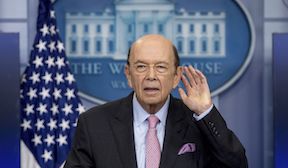The European Union and businesses are warning of more market uncertainty following the Trump administration’s decision to delay U.S. steel and aluminum tariffs for the next month.
President Donald Trump left the world in limbo on Monday until just hours before temporary tariff exemptions for the metals were due to expire for key allies. In a presidential proclamation, Trump allowed another 30 days for the EU, Canada and Mexico to continue negotiations for permanent exemptions. The U.S. made a tentative agreement to remove the tariffs for Australia, Argentina and Brazil, which should be finalized soon, it said.
The EU’s frustration continued over tariffs the U.S. has justified on national security grounds. Last week, French President Emmanuel Macron and German Chancellor Angela Merkel both made their case to Trump for why the EU bloc should get permanent and unconditional relief from the tariffs, partly arguing that they are America’s security partners.
“The U.S. decision prolongs market uncertainty, which is already affecting business decisions,” the European Commission said in a statement on Tuesday. “The EU should be fully and permanently exempted from these measures, as they cannot be justified on the grounds of national security.”
Wider Talks
Commerce Secretary Wilbur Ross said the talks over steel and aluminum tariffs with the EU are forcing a productive conversation about the wider trading relationship. He said he didn’t expect the U.S. will keep adding extensions.

“We are having some potentially fruitful discussions about an overall reduction in trade tensions between the EU and ourselves,” Ross said in an interview with CNBC on Tuesday. “We are getting into a whole lot of topics. We are hopeful that something good will come out of it.”
U.S. Factory Managers Fuming as Trump Tariffs Add to Headaches
With the extension leaving the door open to more permanent arrangements, shares in U.S. steelmakers dropped Tuesday. AK Steel Holding Corp. declined the most almost six weeks, falling 7.7 percent, while U.S. Steel Corp. slipped 4.8 percent as of 10:47 a.m. in New York.
The president’s decision to delay the tariffs gives the White House breathing room as it weighs leaving the Iran nuclear accord this month and prepares for disarmament talks with North Korea’s Kim Jong Un.
The postponement also gives more time for another major priority for the administration: Treasury Secretary Steven Mnuchin will lead a contingent of cabinet members to China this week to try to head off a brewing trade dispute between the world’s two biggest economies.
Great Potential
Trump tweeted Tuesday that there was “great potential” for the U.S. in addressing the trade disparities with other countries.
“Delegation heading to China to begin talks on the Massive Trade Deficit that has been created with our Country,” Trump said. “Very much like North Korea, this should have been fixed years ago, not now. Same with other countries and NAFTA…but it will all get done.”
Trump has dangled a permanent exemption as incentive to reach a tentative Nafta deal with Mexico and Canada, though talks continue with no immediate agreement in sight. Canadian Prime Minister Justin Trudeau has said the U.S. understands that the tariffs could cause job losses on both sides of the border. Canada is the biggest foreign supplier of steel to the U.S., and also America’s biggest customer of the metal.
Canadian Industry
The Aluminum Association of Canada said the industry needs assurances from the U.S. over tariffs as quickly as possible to protect supply chains that have grown increasingly connected over past half century.
“As a strategic ally to the United States, nothing less than a permanent and total exemption is required as soon as possible,” the association said in a statement on Tuesday. “We need certainty in order for the integrated manufacturing supply chain—that both countries helped build over the last 50 years—to work well and keep North America competitive.”
The Washington-based Beer Institute, which represents the American brewing industry, repeated its criticism of the tariffs, which it say will drive up their production costs.
“The tariffs are already having an immediate and disproportionate impact on American brewers and American jobs,” the institute said in statement on Tuesday.
European officials have said the U.S. tariffs violate international trading rules, and they have threatened to retaliate with levies on iconic American brands such as Harley-Davidson motorcycles and Kentucky bourbon.
The White House in March spared South Korea from the duties after Seoul accepted a quota of 70 percent of the average of its steel exported to the U.S. between 2015 and 2017. The U.S. on Monday confirmed that South Korea was granted a permanent exemption.
Trump’s embrace of trade barriers this year has sparked fears of tit-for-tat retaliation that could undermine consumer confidence and stymie the strongest global economic expansion in years.
The dispute comes as Washington seeks to stave off a separate trade conflict with China. The president has threatened to slap tariffs on as much as $150 billion in Chinese imports in retaliation for alleged violations of intellectual property, while Beijing has vowed to retaliate.
Steel and aluminum exporters from China, along with other metal-exporting nations such as Japan and India, have been paying the U.S. tariffs since late March. The U.S. and EU have complained for years that Chinese steel producers unfairly benefit from state subsidies and dump their products on the world market.









